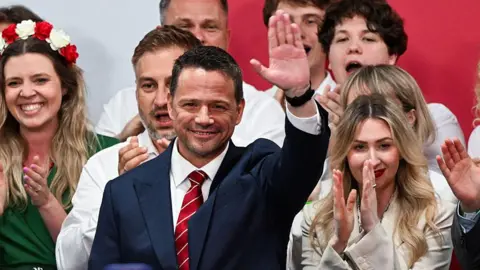The Polish presidential election has reached a pivotal moment, with exit polls indicating a remarkably close race between the leading candidates, Rafal Trzaskowski and Karol Nawrocki. Trzaskowski, the liberal Mayor of Warsaw, claims a narrow edge in one exit poll, suggested to be at 50.3%, compared to Nawrocki’s 49.7%. However, another poll counters this by placing Nawrocki slightly ahead with 50.7% against Trzaskowski’s 49.3%. This discrepancy highlights the uncertainty surrounding the election outcome, with a margin of error of 3% complicating the situation further. The official results are anticipated to be released on Monday morning, according to the state electoral commission.
After the first round of exit polls was released, Trzaskowski addressed a jubilant crowd of supporters in Warsaw, confidently declaring, “We won,” while acknowledging the close nature of the race. His statement, referring to the result as a “razor’s edge,” resonates deeply with both his supporters and the broader Polish electorate. His wife, Malgorzata, humorously expressed her own nervousness during the event. Trzaskowski committed to reaching out to voters who supported his opponent, emphasizing his intention to be a president for all Poles.
On the other side, Karol Nawrocki, supported by the conservative PiS party, urged his supporters to maintain hope, emphasizing that the small vote difference could change as the night progresses. Nawrocki expressed his belief that he could emerge victorious by morning, reflecting the sentiment of uncertainty among his voter base. The role of the Polish president is largely ceremonial, with limited influence on foreign policy and defense matters, yet the power to veto legislation gives significant leverage. The current president, Andrzej Duda, has effectively used this power to hinder Prime Minister Donald Tusk from implementing critical reforms, particularly regarding the judiciary and abortion laws.
If Trzaskowski is confirmed as the winner, it could facilitate Tusk’s efforts to align Poland more closely with the European Union, which is a significant shift from the current administration’s stance. Conversely, a victory for Nawrocki would signify a continuation of the contentious relationship between the presidency and the parliament, re-energizing the PiS, which lost power 18 months ago and may be emboldened to contest the parliamentary election in 2027.
While both candidates support ongoing assistance for neighboring Ukraine, their approaches toward the EU diverge sharply. Trzaskowski, a former Europe minister, advocates for a Poland that plays a central role in EU decision-making processes, maintaining strong ties with key European powers such as Germany and France. In contrast, Nawrocki, a conservative and supporter of traditional family values, favors a more sovereign Poland that resists ceding additional power to Brussels, viewing the EU’s climate and migration policies unfavorably.
Rafal Trzaskowski has built a base primarily among younger, urban voters who tend to support progressive values, including LGBTQ+ rights and migrant inclusion. His ability to connect with these demographics contrasts with the perception of him as part of a liberal elite disconnected from everyday Polish citizens. The reputation of Karol Nawrocki, on the other hand, is more complex. Initially an unknown figure on the national stage, he has positioned himself as a strongman through social media portrayals of an active lifestyle, but his campaign has been marred by controversies, including allegations surrounding his past conduct and misleading claims regarding his living situation.
In conclusion, the Polish presidential election between Trzaskowski’s liberal approach and Nawrocki’s conservative values encapsulates a broader narrative about Poland’s political landscape. As the final vote counts are awaited, the implications of this election extend far beyond the individual candidates; they will shape Poland’s future direction both domestically and internationally. The outcome will not only define who leads Poland in the coming years but will also affect the political climate leading into the next parliamentary elections, significantly influencing the course of Poland’s integration with Europe and its stance on vital social issues.



